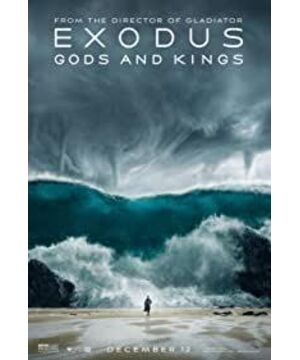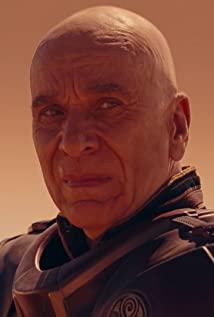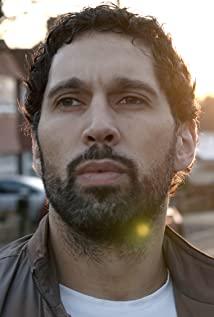but I personally don't feel that the Bible is black. .
1. In the Old Testament, God did not use representations but used voice to tell Moses (but the director deleted the scene where the stick turns into a snake, which seems to support your point of view), but there are no illusions in the Old and New Testaments. For example, the devil's temptation of Jesus seems to have used illusions, and there are also illusions in the Book of Revelation, so using the illusion of a child to communicate with Moses should not violate the religious plot.
2. To say that this movie has joined the entanglement in Moses' heart, this is indeed a major attraction. It seems to be trying to break through the phenomenon of God's existence, but it does not actually violate the "fact" of God's existence. God exists and does not exist. It does not mean that there is no hesitation and struggle of human nature at all. It is precisely the hesitation, doubt and struggle in human nature that highlights the existence of God, because only God can show you the way to return to the kingdom of heaven. It is an interesting idea that Moses was a schizophrenic, but whether it is orthodox Christianity or mysticism, there are similar revelations that appear after self-contradiction and entanglement similar to schizophrenia, epiphany, spiritual calling, etc. This is also a phenomenon that sometimes occurs in such religions. Besides, when Brother Moses saw Moses talking to himself, it can be explained that the mysterious revelation of religion was only given to specific people. In the Old Testament, not all people were chosen by God, and not all Hebrews were Is a prophet (lawyer, prophet, etc.).
2. As for why the illusion is a child, I think this setting is very interesting. I wonder if the director wants to imply that the God of the Old Testament is a "willful child", just like the line said "I want them all to kneel down and beg. I'll stop."
This statement should not be an exaggeration. It seems to be gnosticism. They have a more exaggerated and radical statement, arguing that the God of the Old Testament is actually an evil god, and the God represented by Jesus is the real higher God. Aside from the radical statement (it has a complex world view setting behind it), look at the God in the Old Testament, Jehovah, it seems that he often uses his own temperament to bring disaster to others, and it is an eye for an eye for a tooth. way, like killing the firstborn of the Egyptians. And the first three of the Ten Commandments sound like petty wives domineeringly forcing their husbands to say "I want you to look good if you dare to cheat" (of course, I don't mean to offend believers here, because they should love God more than their own wives and children. , according to Abraham's offering of his son and what Jesus said), so it is actually quite appropriate to set the fantasy as a child, a childish, immature, and temperamental image. Of course, the God in the New Testament is much better, so it will probably be set as Zeus (majesty, power, strength, truth instead of lust and incense), which is probably related to the expansion of the electorate in the New Testament. Well, God is no longer the God of Israel, but the God of all mankind (well, strictly speaking, of course believers). So from this point of view, it is a bit blasphemous to set the illusion as a child (in any case, the orthodox sects regard the old and new testaments as two different gods as a heretic), but it is also in line with the spirit of the Bible. . The New Testament is an improvement on the Old Testament.
3. As for the daring adaptation of Moses' own engraving of the Ten Commandments, I think it is the most classic. The previous shot may be the climax of the picture and the climax of the plot, and the shot here is the climax of the spirit.
First of all, let me explain that Moses himself engraved the Ten Commandments, which is different from the records in the Old Testament, but it is not a problem to say that it did not violate the spirit of religion: Moses naturally engraved God's commandments under God's revelation. If you don't say this, then since the birth of Christianity, there have been so many ecumenical councils to clarify scriptures and beliefs, and to criticize heresies. The first of these were held at the call of the Eastern Roman emperor. If it wasn't for God to guide people to correct the truth, then It's really like what "The Da Vinci Code" said, beliefs are determined by people, not by gods, so it is estimated that there will be no more quarrels.
Secondly, saying that Moses "accepted" the Ten Commandments, (the line in the play: "If you don't agree, put down the hammer") seems to be the engraving of Moses' own values, but, first of all, just said, this is still God's will, Secondly, if you are a historical materialist, then of course you can say that the Ten Commandments were originally the products of the people at that time under specific historical conditions, with historical limitations; but if you are a believer, you will find that the expression of the Ten Commandments is abstract Of course, it is God who can formulate the Ten Commandments with such wisdom. Even if he wants to “correct”, only the Son of God, Jesus Christ, can “correct and fulfill” the Ten Commandments. So in the final analysis it was God's will to show the way for the world, and Moses accepted it because it was the best and only truth.
Third, I think the director's adaptation is a classic because it fully highlights the subjective initiative of man before God. Although it has a materialistic color, I think it is more in line with the Christian spirit - the spirit of contract. The New Testament and the Old Testament are originally a contract between God and man. Since it is a contract, it must be what you want. You must believe in me and you must abide by our agreement. If you agree and sign the agreement, then I will surely bless you. , if you don't keep the promise, you will cause disaster. God has given people the right to choose freely, especially in today’s view (to be honest, in the past, it seems that most of the time people do not believe in religion, what religion they believe in, and what sect they believe in, but it is determined by secular powers. Right), under the impact of modernization, people have more autonomy, just like Moses in the movie can put down the hammer at any time. Only at this time, people's beliefs are voluntarily and not forced by force, and the purity and greatness of beliefs will be more reflected.
So to sum up, I think the director did not stick to the old covenant, but added so many Moses' personal inner entanglements and increased the active factors of so many people. Wouldn't it reflect the value of faith even more? ? Not too strictly speaking, according to Freud, human nature is absolutely self-interested, but according to Plato and others, human nature can take the initiative to approach the truth. Is it more in line with Moses to experience entanglement and suffering and then strengthen his beliefs? What about the common growth path of protagonists in mainstream Western movies? Just like the male lead of the Kingdom of Heaven (though don't know his last belief).
(Of course, it's not to say that the movie doesn't have some strange things. For example, Moses formed the Hebrew Rebellion with the intention of forcing the Egyptian people and army to oppose the Pharaoh through moderate attacks. Later, he decided to quit because he felt that this God had done too much. Wouldn't it be too fast to accept the childish Ten Commandments of God without a bit of foreshadowing in this case???)
I'm not a staunch materialist, but I'm not religious either, I just don't think it's necessary Using a large set of so-called scientific explanations to explain the biblical records, it is too coincidental that so many natural disasters happened at the same time in the year of the Exodus. In the movie, the Egyptians used natural disasters to explain the "ten plagues", which may be to explain that the Egyptians were still obsessed with the power of God, trying to continue to deceive themselves through their own "witchcraft" and so-called "knowledge". In the Old Testament It seems to be said that the Egyptian priestly practices produced some similar phenomenon, which caused Pharaoh to continue to ignore the power of God. So this is done to show that the Hebrew God is the true God.
Anyway, I think this movie is still a pretty good religious movie, and its spiritual pillar is still the Christian faith. Some of the views of Jesus in the New Testament are much better than those in the Old Testament, but after all, it is the story of the Old Testament, so it is inevitable that some of the content cannot be accepted. Besides, the picture of this movie is quite historical. Although it is strange that the Egyptians are white and speak English, but look at the "Lion of Heaven", the ancient Romans actually speak English, and the Han people dress and behave like a barbarian , the difference between the two will be judged. I think this film is a bit inferior to the Kingdom of Heaven, but it is also epic enough to touch it, and the Lion of Heaven can't even see a historical film.
In the end, I personally feel that it is not the religious theme that I resist a little bit, but that the book of Exodus itself was written by the Hebrews, which must have caused the gods of Egypt to be bullied, which is unfair to Egypt. It's not that it is fair to say that Egypt enslaved the Hebrews for hundreds of years, but don't Christians also raise the butcher's knife to the Jews, don't the people enslaved by Egypt and those who enslaved the black people for centuries believe in the same God? Some people have filmed the subject of the Bible, and some people have filmed Greek Norse mythology, but it seems that only mummies and curses are left in Egyptian mythology. Egyptian sacrifices are ignorant in the movie, and their religious gods are nihilistic. However, you must know that many ancient Greek philosophers have traveled to Egypt. The ancient Greeks believed that Egyptians, especially the Egyptian sacrifice class, were knowledge. the masters of , not to mention the influence of the Egyptian goddess Isis in the eastern part of the Roman Empire. So theism or atheism, I hope not to underestimate the gods of Egypt because of this movie or the previous cartoons, the blood of ancient Greece flows in the veins of Christianity, and there are many ancient Greeks in the blood of ancient Greece. Egyptian genes. . . .
View more about Exodus: Gods and Kings reviews











